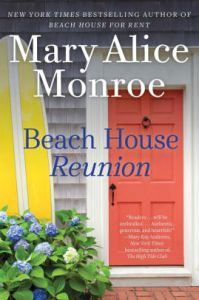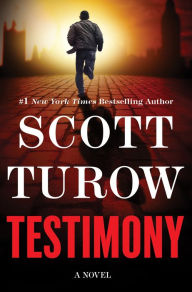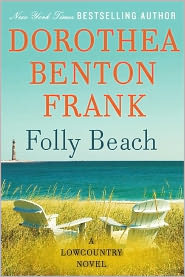 I think we’re going to need a bigger tote. Yes, tote as in tote bag to stow all this season’s beach books. The first wave arrives this month so you can get a headstart on summer.
I think we’re going to need a bigger tote. Yes, tote as in tote bag to stow all this season’s beach books. The first wave arrives this month so you can get a headstart on summer.
Anchoring my haul is the highly anticipated The High Tide Club (St. Martin’s Press, paperback ARC) by Mary Kay Andrews, who when she isn’t wearing her beach book hat is my pal Kathy Trocheck. I’ve gotten used to her breezy novels (Savannah Blues, Beach Town) welcoming summer, but last year she skipped writing a novel to produce The Beach House Cookbook, full of scrumptious recipes. But now she’s back, offering a substantive feast of a novel spiced with intrigue, secrets, drama and romance. It’s scrumptious, too.
Readers of Save the Date may remember Brooke Trapnelle as the runaway bride who literally climbed a tree as part of her escape. In The High Tide Club, Brooke moves to the forefront, a single mom lawyer in the Georgia coastal town of St. Ann who is hired by 99-year-old Josephine Bettandorf Warrick. The eccentric heiress wants Brooke to help her save Talisa, her 20,000-acre island estate with its crumbling pink wedding cake of a mansion, from being taken over by the state and turned into a park. She also needs Brooke to track down the heirs of the three women who were once her best friends — Ruth, Millie and Varina — back in 1941. Josephine says she needs to make amends but won’t say for what.
By flashing back to 1941 every now and then, Andrews hints at some of the secrets the past is holding, like an unsolved murder and divisions of race and class. But Brooke has a lot on her plate in the present, too, coordinating a reunion among women who have never met, untangling family histories and mysteries, taking care of rambunctious toddler son Henry, all the while trying to do her best for Josephine and Talisa. There’s a sudden death, a visit to a Savannah orphanage, a showdown in a lighthouse. You may pick up on some plot twists, and others may take you by surprise. Either way, The High Tide Club is a satisfying saga, just what the summer ordered.
 The title of Nancy Thayer’s A Nantucket Wedding (Ballantine, digital galley) is a bit of a misnomer, not that it doesn’t take place on Nantucket, and not that there isn’t a wedding. But the warmhearted story of blended families is mostly about the summer before the planned fall wedding between Alison and David, both of whom have been married before. They also have grown children and young grandchildren meeting for the first time. Alison’s daughters Jane and Felicity are chalk and cheese, although both have workaholic husbands. Jane is just as absorbed in her legal career as Scott but has started to regret their mutual decision not to have kids. Easy-going Felicity wishes Noah paid as much attention to her and their two kids as his start-up business and efficient “work wife.” Stirring the pot is David’s handsome son Ethan, who can’t help being a playboy flirt. His sister Pamela is intent on taking over her father’s business but being pregnant again wasn’t in her plans. Although Alison tries to ease tensions by being the perfect hostess and preparing delicious meals at David’s luxurious island home, she’s feeling overwhelmed while still getting to know her husband-to-be. Thayer understands the way families work — and don’t work — and if her resolutions tend toward the optimistic, that’s ok. It’s summer. On Nantucket. Go with it.
The title of Nancy Thayer’s A Nantucket Wedding (Ballantine, digital galley) is a bit of a misnomer, not that it doesn’t take place on Nantucket, and not that there isn’t a wedding. But the warmhearted story of blended families is mostly about the summer before the planned fall wedding between Alison and David, both of whom have been married before. They also have grown children and young grandchildren meeting for the first time. Alison’s daughters Jane and Felicity are chalk and cheese, although both have workaholic husbands. Jane is just as absorbed in her legal career as Scott but has started to regret their mutual decision not to have kids. Easy-going Felicity wishes Noah paid as much attention to her and their two kids as his start-up business and efficient “work wife.” Stirring the pot is David’s handsome son Ethan, who can’t help being a playboy flirt. His sister Pamela is intent on taking over her father’s business but being pregnant again wasn’t in her plans. Although Alison tries to ease tensions by being the perfect hostess and preparing delicious meals at David’s luxurious island home, she’s feeling overwhelmed while still getting to know her husband-to-be. Thayer understands the way families work — and don’t work — and if her resolutions tend toward the optimistic, that’s ok. It’s summer. On Nantucket. Go with it.
 A wedding also is in the offing in By Invitation Only (Morrow, digital galley), Dorothea Benton Frank’s latest Lowcountry tale, available May 15. Shelby Cambria is the only child of a wealthy Chicago couple, while her fiance Fred’s mother Diane runs a South Carolina peach farm with her brother Floyd. Both MOG Diane and MOB Susan are guilty of making stereotypical assumptions about the other, and Frank has some fun alternating the narrative between them. Snobby Susan turns up her nose at the down-home barbecue Diane and Floyd host to celebrate the engagement, while Diane feels out of place among Susan’s society friends at a Chicago fete. Miscommunications and misunderstandings ensue, enhanced by an unexpected romance and a stunning scandal. RSVP just for the details of food and drink, whether your taste runs to caviar and champagne or peaches and a pig-pickin’.
A wedding also is in the offing in By Invitation Only (Morrow, digital galley), Dorothea Benton Frank’s latest Lowcountry tale, available May 15. Shelby Cambria is the only child of a wealthy Chicago couple, while her fiance Fred’s mother Diane runs a South Carolina peach farm with her brother Floyd. Both MOG Diane and MOB Susan are guilty of making stereotypical assumptions about the other, and Frank has some fun alternating the narrative between them. Snobby Susan turns up her nose at the down-home barbecue Diane and Floyd host to celebrate the engagement, while Diane feels out of place among Susan’s society friends at a Chicago fete. Miscommunications and misunderstandings ensue, enhanced by an unexpected romance and a stunning scandal. RSVP just for the details of food and drink, whether your taste runs to caviar and champagne or peaches and a pig-pickin’.
 Another of my favorite Lowcountry authors, Mary Alice Monroe, arrives at the party on May 22 with Beach House Reunion (Gallery Books, digital galley), the fifth in her occasional series about Primrose Cottage and the Rutledge family. (The book that started it all, The Beach House, has been adapted for television by the Hallmark Channel and is airing this month). In the new book, Cara Rutledge is now in her 50s and returns to the Isle of Palms with her adopted one-year-old daughter. She’s joined by her niece Linnea, a recent college graduate eager to get away from the restrictions of her proper Charleston upbringing. Ever since family matriarch and “turtle lady” Lovie lived at Primrose, the unpretentious beach house has been a retreat for troubled souls and a way station for those unsure of what’s next. Once again, the life cycle of the sea turtles reflects the characters’ search for home.
Another of my favorite Lowcountry authors, Mary Alice Monroe, arrives at the party on May 22 with Beach House Reunion (Gallery Books, digital galley), the fifth in her occasional series about Primrose Cottage and the Rutledge family. (The book that started it all, The Beach House, has been adapted for television by the Hallmark Channel and is airing this month). In the new book, Cara Rutledge is now in her 50s and returns to the Isle of Palms with her adopted one-year-old daughter. She’s joined by her niece Linnea, a recent college graduate eager to get away from the restrictions of her proper Charleston upbringing. Ever since family matriarch and “turtle lady” Lovie lived at Primrose, the unpretentious beach house has been a retreat for troubled souls and a way station for those unsure of what’s next. Once again, the life cycle of the sea turtles reflects the characters’ search for home.
 Judy Blundell’s first novel The High Season (Random House, digital galley, May 22) proves once again that the rich are different from you and me, and it’s not just that they have more money. For community museum director Ruthie, the price for living on the North Fork of Long Island is renting out for the summer the big house she shares with her ex-husband and teenage daughter during the winter. This summer, though, wealthy widow Adeline and her spoiled stepson Lucas have taken the house for the entire season, and the Hamptons crowd “discovers” the North Fork. Everything changes for the village and Ruthie, who soon discovers her so-called friends are a fair-weather bunch of social climbers and back stabbers. I was so happy to close the book on them.
Judy Blundell’s first novel The High Season (Random House, digital galley, May 22) proves once again that the rich are different from you and me, and it’s not just that they have more money. For community museum director Ruthie, the price for living on the North Fork of Long Island is renting out for the summer the big house she shares with her ex-husband and teenage daughter during the winter. This summer, though, wealthy widow Adeline and her spoiled stepson Lucas have taken the house for the entire season, and the Hamptons crowd “discovers” the North Fork. Everything changes for the village and Ruthie, who soon discovers her so-called friends are a fair-weather bunch of social climbers and back stabbers. I was so happy to close the book on them.
 By contrast, Wendy Francis’ The Summer Sail (Touchstone, digital galley) is the pleasant story of three college roommates on a cruise to Bermuda. Abby, who is paying for the trip, is celebrating her 20th anniversary with professor husband Sam and their teenage sons. Magazine editor Caroline is hoping her longtime beau Javier will propose. Schoolteacher and single mom Lee wants to know why her college student daughter Lacey is being a brat. Actually, Lacey has a secret, and Abby has an even bigger one, so all is not smooth sailing. But pretty much.
By contrast, Wendy Francis’ The Summer Sail (Touchstone, digital galley) is the pleasant story of three college roommates on a cruise to Bermuda. Abby, who is paying for the trip, is celebrating her 20th anniversary with professor husband Sam and their teenage sons. Magazine editor Caroline is hoping her longtime beau Javier will propose. Schoolteacher and single mom Lee wants to know why her college student daughter Lacey is being a brat. Actually, Lacey has a secret, and Abby has an even bigger one, so all is not smooth sailing. But pretty much.
 Remember the women who renovated a Gulf Coast mansion in Wendy Wax’s Ten Beach Road and then got their own reality TV show in subsequent books in the series? They’re back in Best Beach Ever (Berkley, digital galley, May 22), and once again they’re shoring one another up in the face of adversity. They’ve lost their TV show, Do Over, apparently for good this time, have rented out the renovated Bella Flora so as not to lose it, and have moved into cottages at the Sunshine Hotel and Beach Club. Nikki is struggling with her young twins; Maddie is coping with her rock star boyfriend’s resurrected celebrity; Avery is avoiding commitment; Kyra is trying to keep her son out of the Hollywood spotlight; and Bitsy is contemplating revenge. It helps if you’ve read the other books, hardly a chore considering Wax’s sure touch with matters of home and heart.
Remember the women who renovated a Gulf Coast mansion in Wendy Wax’s Ten Beach Road and then got their own reality TV show in subsequent books in the series? They’re back in Best Beach Ever (Berkley, digital galley, May 22), and once again they’re shoring one another up in the face of adversity. They’ve lost their TV show, Do Over, apparently for good this time, have rented out the renovated Bella Flora so as not to lose it, and have moved into cottages at the Sunshine Hotel and Beach Club. Nikki is struggling with her young twins; Maddie is coping with her rock star boyfriend’s resurrected celebrity; Avery is avoiding commitment; Kyra is trying to keep her son out of the Hollywood spotlight; and Bitsy is contemplating revenge. It helps if you’ve read the other books, hardly a chore considering Wax’s sure touch with matters of home and heart.
Read Full Post »
 Riley Sager dedicates his new killer thriller Lock Every Door (Penguin Dutton, digital galley) to Ira Levin, setting up apartment-sitter Jules Larsen in the Bartholomew, an ominous Manhattan high-rise. Out of a job and a boyfriend, Jules is delighted to stay in the gargoyle-studded building overlooking Central Park where her favorite girlhood novel took place. The rules are strict to protect the privacy of the wealthy residents, but it isn’t until fellow apartment-sitter Ingrid disappears that Jules begins to probe the Bartholomew’s sinister history. As with best-sellers Final Girls and The Last Time I Lied, Sager twists familiar tropes to keep readers guessing and reading. Pages fly by.
Riley Sager dedicates his new killer thriller Lock Every Door (Penguin Dutton, digital galley) to Ira Levin, setting up apartment-sitter Jules Larsen in the Bartholomew, an ominous Manhattan high-rise. Out of a job and a boyfriend, Jules is delighted to stay in the gargoyle-studded building overlooking Central Park where her favorite girlhood novel took place. The rules are strict to protect the privacy of the wealthy residents, but it isn’t until fellow apartment-sitter Ingrid disappears that Jules begins to probe the Bartholomew’s sinister history. As with best-sellers Final Girls and The Last Time I Lied, Sager twists familiar tropes to keep readers guessing and reading. Pages fly by. Megan Miranda (All the Missing Girls) also knows how to twist plots and play with memory and perception, as proven by The Last Houseguest (Simon and Schuster, digital galley). In the Maine resort town of Littleport, wealthy summer visitor Sadie Loman picks local girl Avery Greer to be her bestie, which is why Avery doesn’t believe Sadie committed suicide last summer. The narrative hopscotches between past and present, as Avery, who works as a property manager for the Lomans, fends off suspicions that she was somehow involved in Sadie’s fatal fall from the cliffs. Miranda deftly depicts class tensions and the small-town dynamics of the summer season.
Megan Miranda (All the Missing Girls) also knows how to twist plots and play with memory and perception, as proven by The Last Houseguest (Simon and Schuster, digital galley). In the Maine resort town of Littleport, wealthy summer visitor Sadie Loman picks local girl Avery Greer to be her bestie, which is why Avery doesn’t believe Sadie committed suicide last summer. The narrative hopscotches between past and present, as Avery, who works as a property manager for the Lomans, fends off suspicions that she was somehow involved in Sadie’s fatal fall from the cliffs. Miranda deftly depicts class tensions and the small-town dynamics of the summer season. A female friendship is also at the center of Nancy Thayer’s Surfside Sisters (Ballantine, digital galley), but this is leisurely beach book, no murders involved. Successful novelist Keely Green is reluctant to return to Nantucket when her widowed mother becomes ill because it means seeing her one-time best friend Isabelle. Growing up, the two both dreamed of becoming writers, but a betrayal during college set them on different paths. Thayer’s linear narrative follows Keely as she overcomes past obstacles, mainly her family’s skidding finances, and confronts new ones, like the return of her longtime crush, Isabelle’s brother Sebastian.
A female friendship is also at the center of Nancy Thayer’s Surfside Sisters (Ballantine, digital galley), but this is leisurely beach book, no murders involved. Successful novelist Keely Green is reluctant to return to Nantucket when her widowed mother becomes ill because it means seeing her one-time best friend Isabelle. Growing up, the two both dreamed of becoming writers, but a betrayal during college set them on different paths. Thayer’s linear narrative follows Keely as she overcomes past obstacles, mainly her family’s skidding finances, and confronts new ones, like the return of her longtime crush, Isabelle’s brother Sebastian. Queen Bee (Morrow, digital galley) is another of Dorothea Benton Frank’s winning tall tales of Lowcountry South Carolina. On Sullivan’s Island, Holly McNee Jensen works part-time at the library, tends her beloved bees and immerses herself in the lives of next-door neighbor and single dad Archie and his two young sons. This helps her escape the endless demands of her hypochondriac mother, dubbed “Queen Bee” by Holly and her married sister Leslie, who returns home when her handsome husband decides he’s into cross-dressing. There’s high drama as Archie plans to marry a snob with no use for kids, Leslie and her headstrong mother head for Las Vegas, and Holly tells all to her bees, who weaponize. Queen Bee may be implausible, but it’s also sweetly funny.
Queen Bee (Morrow, digital galley) is another of Dorothea Benton Frank’s winning tall tales of Lowcountry South Carolina. On Sullivan’s Island, Holly McNee Jensen works part-time at the library, tends her beloved bees and immerses herself in the lives of next-door neighbor and single dad Archie and his two young sons. This helps her escape the endless demands of her hypochondriac mother, dubbed “Queen Bee” by Holly and her married sister Leslie, who returns home when her handsome husband decides he’s into cross-dressing. There’s high drama as Archie plans to marry a snob with no use for kids, Leslie and her headstrong mother head for Las Vegas, and Holly tells all to her bees, who weaponize. Queen Bee may be implausible, but it’s also sweetly funny.


























